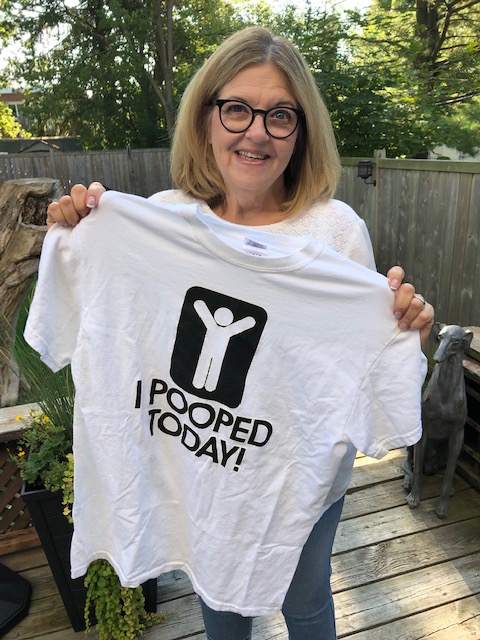
So, we’re going through the ABC’s of Healthy Hormones and well, it seems I got a tad carried away with “F”…We have a whopping four of them as well as an ‘F’ recipe, so I’m counting it as five!
Today, we’re talkin’ Fibre, Fluids, Ferments, Fitness and for fun (see how I did that? LOL), the recipe of the week is Figs, Flax ’n Ferment. Phew.
To many, my ‘F’s’ are just a random list of ‘healthy things we should all be doing’ (and you’re not wrong!) but perhaps more importantly, they also relate to the removal of toxins – which is vital when you are looking at a healthy hormone system.
So yup, you guessed it, we’re leading the discussion to my favourite topic: Poop. (Go ahead and skip forward if the subject is not for you. But c’mon – we all poop, right?)

The thing is, having regular bowel movements is important for a happy endocrine system because it is one important way for our bodies to detox. Possibly the most obvious function of poop is the removal of metabolic waste. If we’re thinking about ‘ideal performance’, poop should also be removing environmental toxins that have crept into our system, helping us rid our systems of various nutrients and hormones that we have in excess, and removing anything from our bodies that we no longer need.
You can see why making sure that all the pipes are working and that we’re ‘regular’ is important for balanced hormones. But just what do we mean by ‘regular’? Ask 10 different people and you’ll very likely get 10 different answers – because it’s their regular. If they’re pooping once a week – yeah sure, they’re ‘regularly’ pooping at one-week intervals. ?. But know this for sure: it doesn’t mean that they’re healthy!
A quick internet search gives you these general guidelines: Anywhere from three times a day to three times a week is ‘normal’. No offence, internet…but that’s a pretty big range. Putting that into perspective, one person could be having 21 bowel movements a week and another could be having 3 and both would be considered ‘normal’.
Okayyyyy, but do you really want Friday’s fish fajitas to still be in your body the following Monday – you know, days after you’ve eaten it? That’ll provide more time for mercury and other heavy metals from the fish to linger in your body, which can affect thyroid hormones (but we’ll go into more detail about that when we get to T is for Thyroid!) Even if it wasn’t fish, you’d still be allowing for extra time for toxins (e.g. from produce pesticides or hormones from meats) to build up and this is going to lead to hormonal imbalances or worse, possibly even colorectal cancer.
In the holistic nutrition world, we’re aiming for one meal in, one meal out – with a gut transit time of about 18-24 hours. If you’re close to three meals and three poops each day, then congrats you’re doing very well! If not, continue reading below for the Fantabulous Five.
Before you think we’re done with talking poop -it’s not just quantity that I want you to think about. It’s also the quality of your poops. Ask yourself these questions:
- Are my stools drier, lumpier, and harder than normal?
- Are they difficult to pass?
- Are they loose and fluffy?
- Is it a mixed bag and something I just can’t predict?
- Do I have abdominal pain and bloating?
If you’re answering ‘yes’ to any of these questions, you may actually be constipated. And yes – loose stools can be a form of constipation. Truth. When things are not moving smoothly, when it feels like you are not fully emptying everything, when you are not forming good stools, when you are not pooping on the regular – all of these things are forms of constipation.
Look, you are not alone. About 14-24% of adults experience some form of constipation and this can be caused by diet or stress, and even changes to our daily routine. Sometimes the culprit is a medical condition or medications. And sometimes there can be a structural problem with the gut. Many times the cause is unknown. Frustrating I know. Especially when it may be impacting your hormonal balance.
Whether you know why or not, here’s what you can do about it: Ta Da! I give you the Fantabulous Five:
Fibre
You’ve probably heard to eat more prunes (and figs and dates) if you get constipated.
Why is that? It comes down to fibre.
Dietary fibre is a type of plant-based carbohydrate that we can’t digest and absorb. Unlike cows, humans don’t have the digestive enzymes to break it down. And that’s a good thing! Even though we can’t digest it, fibre is very important for our gut health for two reasons.
First, fibre helps to push things through our system (and out the other end).
Second, fibre is an important food for feeding the friendly microbes in our gut. And having a microbial village inside us where the bad guys do not outnumber the good guys makes for better hormonal balance and overall gut health.
There are two kinds of fibre: soluble and insoluble.
Soluble fibre dissolves in water to make a gel-like consistency. It can soften and bulk up the stool; this is the kind of fibre that you want to focus on for helping with constipation. Soluble fibre is found in legumes (beans, peas, lentils), fruit (apples, bananas, berries, citrus, pears, etc.), vegetables (broccoli, carrots, spinach, etc.), and grains like oats.
Psyllium is a soluble non-fermenting fibre from corn husks. It’s been shown to help soften stools and produce a laxative effect. You can add it to smoothies or yogurt or homemade baked goods to boost your daily intake.
Insoluble fibre, on the other hand, holds onto water and can help to push things through the gut and get things moving. It’s the kind found in the skins and seeds of fruits and vegetables like asparagus, broccoli, celery, zucchini, apples, pears, and potatoes.
It’s recommended that adults consume at least 40 grams of fibre per day. Here’s the kicker though, most people who eat a Standard North American (SAD) diet get between 15 and 20.
I am all for boosting your fibre. It really can help with a multitude of issues beyond keeping you regular. Fibres helps you to feel full so you are less likely to snack inappropriately. It also helps keep blood sugar balanced, improves cholesterol and may assist in reducing the risk of various cancers including colon cancer.
As you increase your fibre intake, make sure to do it gradually. Radically changing your diet could make things worse.
NOTE: There is conflicting evidence on how fibre affects constipation. In some cases, less insoluble fibre may be better, especially if you have certain digestive issues. So, make sure you’re monitoring how your diet affects your gut health and act accordingly. And don’t be afraid to see your healthcare provider when necessary.
Additionally it’s also very important to combine increased fibre intake with my next point – drink more fluids.
Fluids
Since constipated stools are hard and dry and fibre is a bulking agent, drinking more fluids can help keep everything hydrated and moist. This is especially true when trying to maintain a healthy gut every day, rather than when trying to deal with the problem of constipation after it has started.
People with diabetes – an insulin regulating issue – are at higher risk of becoming dehydrated. As are those whose adrenals are under stress. In addition to your stress hormones, the adrenals also produce aldosterone, the hormone which helps regulate your body’s levels of fluid and electrolytes. So as your adrenal fatigue progresses, your body’s production of aldosterone drops, triggering dehydration and low electrolyte levels,
Pure filtered water is always the best choice. But it doesn’t only have to be water – watery foods like soups, and some fruits and vegetables can also contribute to your fluid intake. Check out this post for some more ideas.
Fermentation
Probiotics are beneficial microbes that come in fermented foods and supplements. They have a number of effects on gut health and constipation. They affect gut transit time (how fast food goes through us), increase the number of bowel movements per week, and help to soften stools to make them easier to pass.
But even more importantly, there’s a growing body of emerging research that indicates that the gut microbiome plays an important role in the regulation of estrogen levels and therefore influences the risk of developing estrogen-sensitive diseases like endometriosis, polycystic ovary syndrome (PCOS), and some cancers including breast and prostate. I covered a lot of issues around estrogen in a recent blog post so you can review specifics here.
I always recommend starting with food and probiotic foods (and drinks). Include fermented vegetables (like sauerkraut and kimchi), miso, kefir, tempeh, plain yogurt, and kombucha.
However, for many people, additional supplements of both probiotics and prebiotics (the food that microbes eat) may be required to overcome gut dysbioisis and help to balance estrogen. There are hundreds of strains of gut bacteria – this is definitely a case where one size does not fit all. More research is needed when it comes to choosing a specific probiotic supplement or strain. It’s always best practice to consult with an experienced nutritionist or other health professionals before adding probiotic supplements to your daily regime so that you can choose the most appropriate strain for your condition or health concerns.
Fitness
Some studies show a gut benefit from regular exercise which is defined as about 150 minutes per week. That’s about five 30 minute sessions. But honestly, I believe we all do best when we are moving 7 days out of 7. It does not have to be strenuous – a brisk walk, a short series of yoga stretches and asanas, a moderate bike ride, a game of hoops down at the park – research shows that if you do something you enjoy, chances are you’ll stick with it.
There is no ‘best’ time of day to get your movement in although some experts say that getting in your workout in the morning can help boost metabolism for the rest of the day. And frankly there are fewer distractions and excuses if you just ‘git ‘er done’! But fit it in where and when you can. In fact, there is really no difference in getting three 10-minute sessions in during the course of the day or one 30-minute session.
Here’s an idea: the 7-minute workout is a fast, HIIT-style and simple home workout – no equipment necessary. Run through that twice and take a brisk 15 minute walk and you’re good to go! There are lots of apps that can time you and guide you, but if you click here you’ll find an easy infographic that shows you the exercises.
The best news (aside from how quick you can get your movement in with a HIIT workout!) is that studies show that this type of fast, short, intense movement helps to regulate two key hunger hormones – ghrelin and leptin – so you will be able to develop a better handle on when to eat (true hunger versus emotional hunger) and more importantly, when to stop.
Exercise can help your body pump out feel-good neurotransmitters like serotonin and dopamine (which some people call the ‘happy hormone’!) Both help to combat stress levels and the stress hormone, cortisol. (For more Cortisol Busters, pop on over to the post, “Let’s talk about Stress, baby.”).
Conclusion
Focus on the Fantabulous Five for hormonal health.
Optimal digestion is so important for overall health. Constipation is a common problem and can lead to hormone imbalances.
Increasing our fibre and water intake and boosting our friendly gut microbes are key things we can do to help things move along.
And don’t forget how lifestyle habits can affect our physical health! Moving regularly can help us maintain great gut health and manage our hormones.
Recipe: Figs, Flax ’n Ferment
Serves: 1
Hit up the fibre and ferment with this fun fiesta of flavours (you get fibre from flax and figs and the ferment from the yogurt)!
Ingredients:
- 1/2 cup Plain Greek Yogurt
- 1 Tbsp Ground Flax Seed
- 3 Figs (sliced)
- 1 Tbsp Maple Syrup
Directions:
- In a small bowl, mix together yogurt and flax. Top with figs and drizzle syrup over top. Enjoy!
References:
https://www.dietvsdisease.org/best-laxatives-constipation/
https://www.dietvsdisease.org/chronic-constipation-remedies-for-relief/
https://www.precisionnutrition.com/research-constipation-fiber
https://medlineplus.gov/ency/article/002136.htm
https://www.health.harvard.edu/blog/probiotics-may-ease-constipation-201408217377
https://www.health.harvard.edu/newsletter_article/6-ways-to-enjoy-fiber-in-your-diet
https://www.health.com/mind-body/14-surprising-causes-of-dehydration?slide=128685#128685
https://kresserinstitute.com/gut-hormone-connection-gut-microbes-influence-estrogen-levels/
